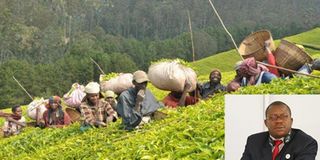How Ugandan tea growers won climate change award

Kayonza Growers Tea Factory workers pick tea. The factory engages in tree planting as a way of integrating climate strategies in its tea farming systems. Inset is Gregory Mugabe, board chairman, Kayonza Growers Tea Factory
What you need to know:
Celebrating hard work. For their effort in reducing poverty and saving the environment, Kayonza tea factory bagged a UN award.
The Kayonza Growers Tea Factory, Kanungu District in Uganda, has received the Equator Prize 2015, an award by United Nations Development Programme (UNDP) on the sidelines of the COP21.
COP21 refers to the 21st Conference of the Parties that is, countries that signed up to the 1992 United Nations Framework Convention on Climate Change.
The award recognises the perseverance of indigenous people and local communities whose efforts are helping to tackle climate change and protect the environment.
Kayonza Growers Tea Factory won in the category of Community-Based Adaptation to Climate Change and Sustainable Livelihoods. Gregory Mugabe and Donata Turyamwesimira represented the farmers group in Paris to receive the prize together with 21 other indigenous and local community groups from 19 countries working with community innovations to reduce poverty, protect nature and strengthen resilience in the face of climate change.
“Our winners tonight are an inspiration,” noted UNDP chief Helen Clark, adding: “Climate change affects all of us—rich and poor, developed and developing, urban and local. It is truly an all-of-society concern that requires an equally all-of-society approach. These people and groups have shown that action and innovation against climate change can and does happen at all levels, and this should be encouraged, supported and scaled up.”
The winners came from five Central and South American countries, five winners from six African countries, two winners from two Middle Eastern countries and six winners from five Asian countries. UNDP, with a $2.3b (about Shs7.4 trillion) portfolio across 140 countries, is the UN’s largest implementer of climate change programmes at country level.
The Equator Prize recognises “courageous indigenous and local communities who, despite limited resources and no government support, have employed innovative solutions to protect their forests, fields, coasts and waterways from destruction”.
The award
It is the flagship programme of the Equator Initiative, a partnership that brings together the UN, governments, civil society, businesses, and grassroots organisations to advance sustainable development solutions.
So how did Kayonza Growers Tea Factory win the $10,000 (about Shs33.6m) award? “We started the climate change adaptation and mitigation among farmers in 2010 after our area experienced prolonged drought and destructive rainfall, which affected both food crops and tea farms,” says Mugabe, the chairman board of directors, adding: “What made us win the award is how we integrated climate strategies in our tea farming systems.”
The group has also focused on food security by introducing new crop [species] like cassava, sweet potatoes and matooke that are resistant to drought and pests and diseases to make communities more resilient to climate change impacts.
Now more than 4,800 smallholders have been introduced to these new staple or cash crops.
“Our members are also engaged in tree planting in degraded areas and we are using more modern water conservation techniques by providing water tanks to women farmers for domestic and agricultural use during drought,” says Mugabe.
Kayonza Growers Tea Factory is 100 per cent owned by its 7,205 smallholder tea farmers operating adjacent to Bwindi Impenetrable National Park, one of Uganda’s oldest rainforests and home to 50 per cent of the world’s mountain gorillas. Facing deforestation, wetland encroachment, the tea farmers are engaging the population to address energy efficiency and natural resource management. Kayonza Growers Tea Factory installed energy saving cooking stoves to combat deforestation.
“Our home is quite close to the Mountain Gorilla habitat so we ensure practices that maintain a buffer zone and deter encroachment on the forests,” says Mugabe.
He adds: “More than 4,000 of our farmers have been trained in conserving wetlands, riverbanks and natural forests.
The role of forests
Forests present a significant global carbon stock and deforestation is estimated to have been the cause of 20 per cent of annual greenhouse gas emissions in the 1990s. A study by the Economics of Land Degradation Initiative shows land degradation is costing the world as much as $10.6 trillion every year, equivalent to 17 per cent of global gross domestic product.
Greenhouse Gas emissions associated with land degradation and loss of vegetation cover contribute a lot to climate change.
Kayonza tea farmers have planted more than 20,000 indigenous trees on farm borders and degraded hillsides. The initiative is a model of smallholder-led adaptation to climate change, integrated ecosystem restoration, reforestation and eco-agriculture.
What has tea growing got to do with climate change? Small scale holder farmers in countries such as Uganda, which are some of the most affected by climate changes, play a crucial role in limiting emissions from land usage and destruction of local environment. At COP21, farmers like Mugabe expect a binding agreement that commits more resources to enable communities cope with climate changes as well as avail opportunities for conservation of local environment. A deal from Paris must include local communities because they are the most affected by climate change.



